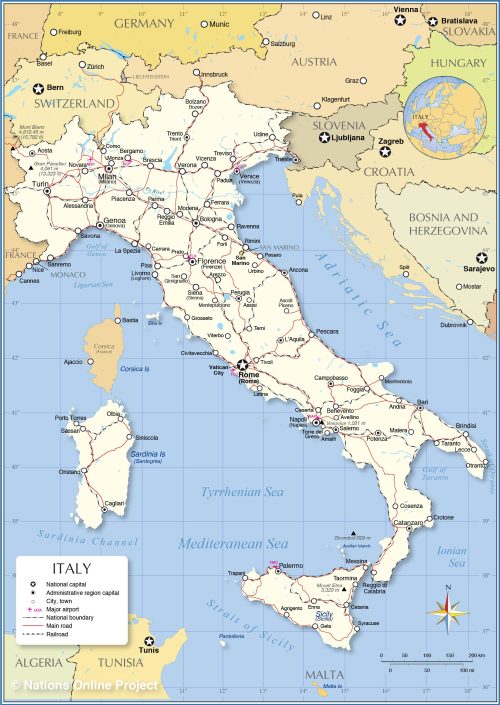#41: Italy, 1997In the midst of life, we are in death.
The final months of our first year in Italy were filled with travel, loss and near-loss, visits from friends and the pleasures of Christmas in our own home.
[As always, you can click on photos to enlarge them.]August 28
Earlier in the month, we spent a delightful couple of days in Ravenna on the NE coast. We had a three-hour drive on a direct freeway passing through 15 tunnels, one of them over 1.3 miles long! As the road crosses over the Apennines, it ascends a narrow canyon, most of it on a viaduct which is quite high. It took some serious mental discipline to over-ride the disconcerting sight of alternating tunnels and viaducts.
Ravenna’s beginnings are lost in antiquity, although one theory is that it may have been founded by the ancient Umbrians, the same folks who brought you Amelia. In its earliest days, it was a fishing community on stilts among tidal islands. As the city developed, the channels and marshes were filled in. Otherwise, Ravenna might look like Venice, both having started the same way.
During Imperial Roman times, it was a major port and key city. Julius Caesar paused there with his troops before crossing the Rubicon and changing the course of history. When Rome fell to the barbarians, the failing empire split in two with Ravenna as the capital of the western branch and Byzantium (now Istanbul) as the seat of power for the eastern branch. Both courts were Christian.
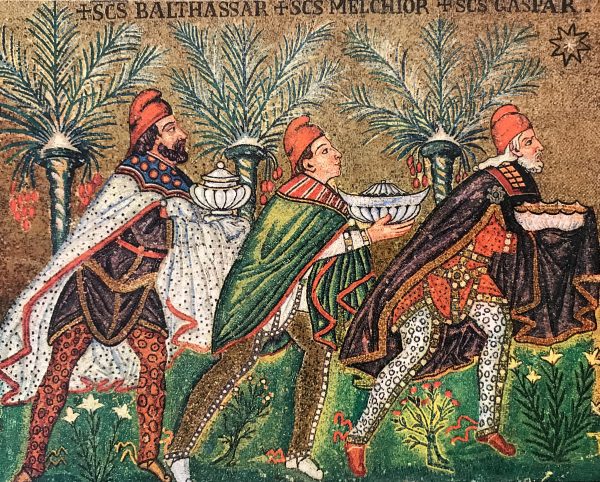 It was during this period — 6th century, A.D. — that the churches and tombs we visited were built. It’s amazing to see these large and elaborate buildings still standing with many of their sophisticated and beautiful mosaics intact. The palace is now mostly facade and foundations. Up the street in the church built by the Emperor Theodoris is a beautiful rendering in mosaic of how the palace looked, complete with fancy curtains blowing in the wind.
It was during this period — 6th century, A.D. — that the churches and tombs we visited were built. It’s amazing to see these large and elaborate buildings still standing with many of their sophisticated and beautiful mosaics intact. The palace is now mostly facade and foundations. Up the street in the church built by the Emperor Theodoris is a beautiful rendering in mosaic of how the palace looked, complete with fancy curtains blowing in the wind.
We visited an exhibition of modern mosaics and discovered several that we liked. Most of these mosaics did not approach the intricacy and sophistication of those from the 6th century. Perhaps the artists don’t have the time, the vision or the talent. Still, it’s hope-full that this ancient art is being revived. Maybe all that’s needed is for enough artists to be trained for a modern maestro to develop.
In recent decades, Ravenna has been thoughtfully renovated by the city fathers and mothers. A number of narrow medieval streets — now lined with coffee shops, restaurants and boutiques — are reserved for pedestrians and bicycles.
September 10
Back from a week in Gargano, the “spur” on the “boot” of Italy — or if you prefer a less prosaic description, the peninsula far to the SE. It was a long drive down, and we arrived after dark. So we spent the first day recuperating, walking on the beach, swimming in the pool, reading and just generally resting up.
The next day, we decided to go into nearby Peschici (pes-kee-chee) for breakfast (the hotel’s morning offering not being so terrific) and some sightseeing. As we sat with chocolate croissants and cappuccinos at an outdoor cafe, I glanced at the headline on another patron’s Italian newspaper. “Diana morte per una foto” — “Diana dead for a photo.” Such a strange phrase, it seemed some sort of metaphor. It wasn’t until we’d finished eating and sauntered down to the newsstand that we truly understood what had happened. All the newspapers — Italian, French and German (lots of Germans visit this coast) — had photos and stories about the car crash and Princess Diana’s death.
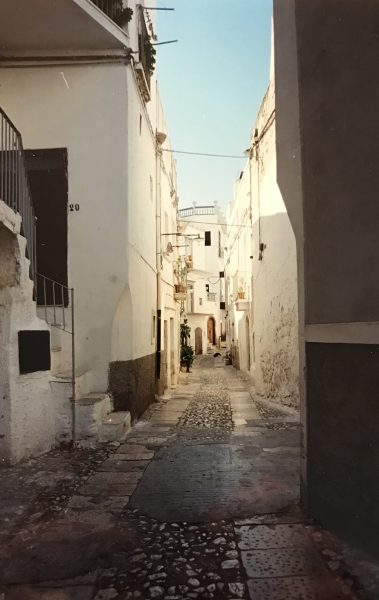 We couldn’t find an English-language paper, so we grabbed the last copy of Le Figaro and pieced together the terrible story despite our rusty French. It seemed just unbelievable. Most of the tourists hadn’t been watching TV, so this was the first time that many of us got the news — 24 hours after the rest of the world.
We couldn’t find an English-language paper, so we grabbed the last copy of Le Figaro and pieced together the terrible story despite our rusty French. It seemed just unbelievable. Most of the tourists hadn’t been watching TV, so this was the first time that many of us got the news — 24 hours after the rest of the world.
Diana’s death cast a pall over the rest of the day and the rest of the vacation. After breakfast, we walked through Peschici’s narrow lanes among brilliant white buildings, the sad news never far from our thoughts. We then drove to Vieste, further down the coast, where we had a marvelous lunch in a restaurant inside a grotto. A wedding party was just leaving the cathedral — the vision of young love and happy families boosted our spirits.
The following day, we visited the famous forest atop the promontory’s mountains — ancient beeches forming a high canopy above their own thick trunks. A very quiet and cool world up there, far above the towns and the sea. Our next day was spent on easy-going beach and pool time
[Something I didn’t tell the family: At the end of that beach day, I had a migraine so debilitating that I ended up in bed in a dark room with pillows on both sides of my head to keep it from moving. A doctor arrived with an unknown super pill that finally let me sleep. That was the beginning of life-long, periodic migraines finally diagnosed some years later at Johns Hopkins. Once the doc said “photophobia,” we began managing that sun-kindled pain.]
Another sightseeing day found us driving along the beautiful coastline, often high above the turquoise sea. Medieval watchtowers still stand along the coast, and we got out to walk around one. If I ever become super-rich, I’d like to renovate one of those towers for a vacation home. They’re truly special, with spectacular views.
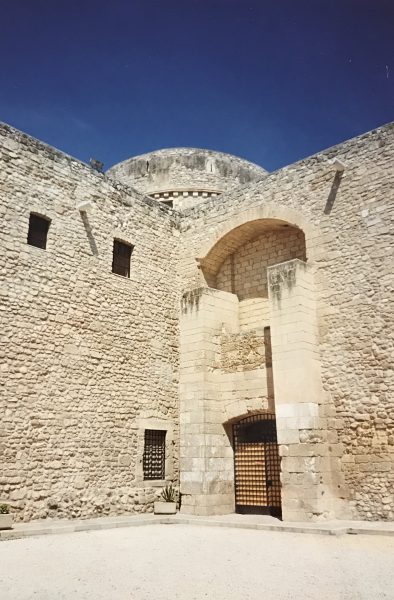 Our drive continued to Manfredonia, the embarkation point for the Crusades, now a rather ugly industrial town of dusty apartment buildings. The only saving grace is that Manfred’s castle still stands, renovated and converted into a museum with a fascinating exhibition on early humans in this part of Italy. We returned to our hotel via Monte San Angelo. The warrior Archangel Michael is believed to have appeared there, so the Crusaders went to pray at his shrine before embarking for the Holy Land. That was a truly terrifying drive. Our map showed an extremely squiggly line going almost directly up from the coast, and that’s the way the road was — countless switchbacks with steep drop-offs.
Our drive continued to Manfredonia, the embarkation point for the Crusades, now a rather ugly industrial town of dusty apartment buildings. The only saving grace is that Manfred’s castle still stands, renovated and converted into a museum with a fascinating exhibition on early humans in this part of Italy. We returned to our hotel via Monte San Angelo. The warrior Archangel Michael is believed to have appeared there, so the Crusaders went to pray at his shrine before embarking for the Holy Land. That was a truly terrifying drive. Our map showed an extremely squiggly line going almost directly up from the coast, and that’s the way the road was — countless switchbacks with steep drop-offs.
We spent our next-to-last day visiting the Tremiti Islands. The boat from Peschici took about two hours. Then we boarded a lighter to another island where there’s an abbey founded by the Benedictines in the 9th century. It’s now being renovated by the European Community. Even though it’s mostly in ruins or covered in construction impedimenta, it’s still a fascinating site, especially the old chapel with its 13th century Byzantine crucifix. We returned to Peschici as the setting sun was turning the water to bronze.
On our final morning, we walked into town for our usual coffee and pastry. When the barman saw us enter, he turned the TV to CNN, which was covering Princess Diana’s funeral. He then kept it on CNN for the whole funeral, a typically Italian gesture of hospitality that I expect will remain with me forever.
[Although reading many of my old letters has revealed details I’d forgotten or mis-remembered, this memory had remained unblemished and still moving.]
Now that we’re back home, and it’s hunting season, our biggest challenge is how to keep Zack safe. Hunting is permitted only on certain days of the week, when hunters are allowed to cross our property unless it’s fully fenced. Two blinds have been built within 100 meters of our boundary line. We’re having a couple of “No Hunting” signs made, but we’ve been told they’re likely to be honored in the breach.
October 1
Greetings from the earthquake zone! We hardly felt it and were unaware of all the damage in Assisi (50 miles away) until a friend called from France to inquire with some urgency if we were all right. Then phone calls started coming in from three continents, and we went out to buy a paper. Only then did we discover that the frescoed ceiling of the St. Francis Basilica had fallen, killing four people, with another six dead nearby. Here, it was a mild rumble in Amelia and not much at our house. Perhaps we’re on a different sort of geological structure? There have been only 20 earthquakes in this immediate area since 1350, so we’ve probably had ours.
Russell was in Manila in mid-September, traveling two days each way for three days of work. He’s now writing his report, hoping to finish in time for the celebration of our 25th anniversary this weekend.
Our water pump burned out Saturday night. We left the dirty dishes and used our emergency drinking and washing water to get through the drought. The next morning, we phoned super-plumber Marco. Conscientious as ever, he came over, started calling suppliers and finally found one who was willing to open on Sunday. Then Marco drove to Terni to collect the pump and install it. We had water by 3:00. I can’t help but think that elsewhere we’d have had to wait until Monday for service.
Two sets of houseguests this month — a sorority sister now a recognized seascape artist in the Carolinas, here to consider whether she’d like to be artist-in-residence at a nearby art school, and two Canadian friends from Tanzania days. Fernanda was born in northern Italy and inherited family property there, so they dropped by after taking care of business up north.
October 28
More company come and gone. Bridesmaid Lynne Aoki and husband Don Robinson, both very dear friends from before R&I met, spent three days with us as we toured hill towns, ate lots of good food and solved all the world’s problems.
We’ve really enjoyed seeing all these old friends who’ve come during the last six months, but truth to tell, we’re looking forward to a quieter time for a while — no extra sheets and towels to wash, simpler cooking, less showing folks the sights and more together-time, more reading, more music.
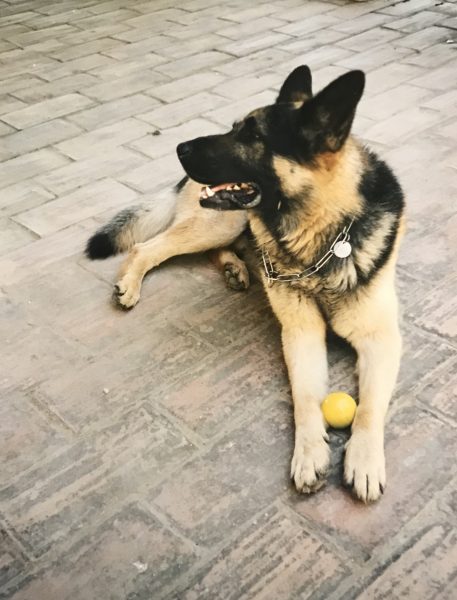 We’ve just come to the end of a disturbing incident with a local hunter. On hunting days, we keep Zack chained, and we only walk him on our property. On non-hunting days, he has more freedom, including a walk on one of the surrounding dirt roads. On a Thursday, a couple weeks ago, Russell was giving Zack a longer walk. Suddenly, a hunter came up the road with three small hunting dogs. Zack was sniffing bushes when one of the dogs came running, fangs bared, and attacked him. Zack first looked startled and then retaliated, rolling the smaller dog over on his back and worrying at his stomach. Russell was wading in to grab Zack’s choke chain, when he spotted the hunter out of the corner of his eye, gun raised and ready to shoot Zack in the head.
We’ve just come to the end of a disturbing incident with a local hunter. On hunting days, we keep Zack chained, and we only walk him on our property. On non-hunting days, he has more freedom, including a walk on one of the surrounding dirt roads. On a Thursday, a couple weeks ago, Russell was giving Zack a longer walk. Suddenly, a hunter came up the road with three small hunting dogs. Zack was sniffing bushes when one of the dogs came running, fangs bared, and attacked him. Zack first looked startled and then retaliated, rolling the smaller dog over on his back and worrying at his stomach. Russell was wading in to grab Zack’s choke chain, when he spotted the hunter out of the corner of his eye, gun raised and ready to shoot Zack in the head.
“No! Stop!” Russell shouted, grabbing Zack and pulling him away from the little dog. The hunter checked over his canine, which gamboled away with his confreres, and that seemed the end of it.
Russell was still upset a half-hour later when I returned home to hear the tale. He felt Zack was only milliseconds away from being blown apart when he was only defending himself. We talked it over, resolving to be more careful and cautious in future, and put the experience behind us.
Over a week later, the hunter drove up and told Russell we owed him 450,000 lira for his dog — surgery, medicine and petrol — over $200. “But your dog attacked mine!” R said. The hunter said, “You were on a road with a big dog, unleashed and unmuzzled. You’re at fault.” “Your dogs weren’t under control either,” R replied. The hunter answered, “Hunting dogs which are in the act of hunting don’t have to be leashed.” Russell said we might be willing to accept some responsibility, but not all. “You have insurance,” the hunter countered. “Insurance?” R asked. “Of course! Dog insurance,” come the confident reply. R said he needed to talk with me and some authorities before he was willing to take action. The hunter gave him one week.
We’d never heard of dog insurance, but apparently it’s common here. Almost everyone who has a dog has such insurance, and when there’s a fight, the insurance company pays. Learning this made us suspicious the bill had been padded. With the assistance of Amelia friend Umbro, who’s helped us in so many things, we did some research and discovered the following: Thursday is a provisional hunting day; i.e., the hunter can hunt if he has special permission (we didn’t know about this proviso, or R wouldn’t have had Zack out). But all dogs must be leashed on a road, even if they’re hunting dogs en route to the next field. Furthermore, in such circumstances, each insurance company pays half in recognition of both parties being at fault.
We invited the hunter back, asked Umbro to interpret, relayed the information we’d discovered and offered the hunter half the sum he’d requested. He seemed glad to get it, so the incident was closed. Still, it left us concerned about what to do with Zack during the five-month hunting season. Everyone comes out here to run their dogs sans leash and muzzle. It may be against the law, but it’s the custom. A big dog like Zack needs daily, vigorous exercise, or he’ll go dingy. We have five acres for him to run in, but it’s planted in alfalfa in agreement with neighbor Paolo, who hasn’t cut it yet, so it’s not available for Zack-ercise.
We spent the first two weeks of this month in intensive language training in Todi. Two hours of grammar and two hours of conversation every morning. Up at 6:30, feed selves and animals, drive to Todi, hike up the hill to the school, struggle to be understood in Italian, grab a bite to eat, back home, chores in afternoon, homework at night. It was well worth it: we both feel ourselves much improved. Our hope is to practice our gains during everyday life for a while, then sign up for another two weeks and so on. Our classroom was in a 16th century monastery, so just walking through the portals was inspirational.
November 30
We dressed up and went Halloween trick-or-treating at our Amerini friends’ houses. This very American holiday isn’t observed in Italy, but our surprise visits were a success. The children were thrilled, and the adults were charmed, one even taking a video.
Russell’s been pruning the nut trees, while I work half-days on my novel. We’ve arranged for delivery of ten fruit trees next Friday (two each of apple, pear, apricot, peach and cherry). This is the right time of year to put trees in the ground, so we’ll add them to our three ancient plum trees and have a full orchard to the right of our driveway as you enter.
We’re looking forward to our first Christmas in our own house in a long time. We’ve spent so many Christmases overseas or in somebody else’s Stateside house, that it’ll be a real treat to be in our own home.
December 28
The month started off with me coming down with a respiratory flu that put me in bed for a few days and then just hung on. It’s been a long month of congestion, low energy and all the rest of it.
Meanwhile, Russell, Paolo and Ornella got some sunny days in which to harvest our olives, so here’s Russell to describe that:
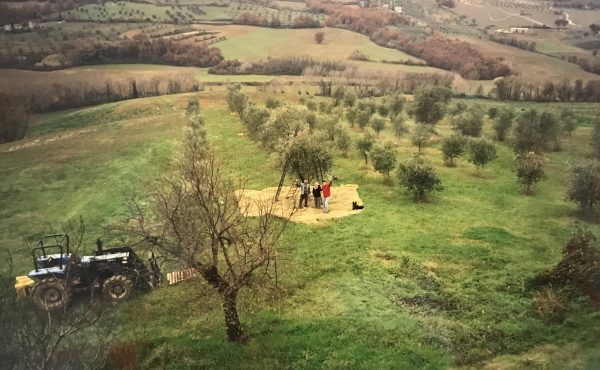 Because of a blight some years ago, most of our 100 trees are babies in their first bearing year. As a result, our 300 kg olive crop was puny compared with orchards of full-grown trees. For example, neighbors Paolo and Ornella collected over 13,000 kg from their 300 trees. Still, for me, every olive was a novelty. All colors in all stages of maturity get harvested — green, rose and black. Harvesting is by hand with a tool like a large nutcracker held on the wrist by a loop. You strip the olives from each branch, using long ladders to reach the higher elevations. The falling fruit drops into nets spread around the trunk. Then the net is tipped into large plastic “milk crates” for hauling to the mill once all olives are harvested.
Because of a blight some years ago, most of our 100 trees are babies in their first bearing year. As a result, our 300 kg olive crop was puny compared with orchards of full-grown trees. For example, neighbors Paolo and Ornella collected over 13,000 kg from their 300 trees. Still, for me, every olive was a novelty. All colors in all stages of maturity get harvested — green, rose and black. Harvesting is by hand with a tool like a large nutcracker held on the wrist by a loop. You strip the olives from each branch, using long ladders to reach the higher elevations. The falling fruit drops into nets spread around the trunk. Then the net is tipped into large plastic “milk crates” for hauling to the mill once all olives are harvested.
Like most small to medium-sized enterprises here, the local mill is a family concern with granddad, dad, son and nephew doing 90% of the work. Although small-scale, its equipment is modern and mechanized. The olives are dumped into a hopper, stripped of leaves and twigs, washed and dried, crushed (pits and all) into a thick paste, pressed to extract the oil and then centrifuged to separate oil from water. The mill was enticingly fragrant with the aroma of warm olives. The entire operation for our batch took about an hour. You bring your own vessels and receive your own oil. Our olives produced oil at a rate of 14.2 kg per 100 kg of fruit, considered excellent. We ended up with 48 liters of oil, enough to fill our family needs for 2 years and give plenty of gifts. The color is bright, grassy green, said to be the best you can get.
Nancy returning to tell the rest of December’s story:
Once I started feeling better, I began baking and cooking for Christmas. I prepared a large plate for all our Amerini friends — ten plates in all: fruit cake, four kinds of cookies, two kinds of candies, two kinds of bars. Wonderful to have access to these recipes which had been in storage for years. Folks were very touched, and many responded in kind with the traditional Christmas treat of the region — a softball-size confection of chocolate, figs and two kinds of nuts.
Younger friends from Kazakhstan days, now living in Budapest, arrived on the 19th to share the season. They helped Russell outside with lots of tough chores, truly earning their keep. We enjoyed a number of traditional winter dishes at local restaurants, including polenta with wild boar, but I also cooked a lot of special fare to keep the three of them going. Not sure I want to open a country inn and do it all the time, but special food and its preparation make it seem more like the holidays.
And being in Italy also makes it seem more like Christmas. The Amerini really have the Christmas spirit, greeting each other with glee and good wishes (“Buon Natale!” “Buone Feste!” “Auguri!”). Although gift-giving is an important part of the holiday in Italy, it’s not nearly so commercial as it’s become in the States. All the gifts we received were made by hand.
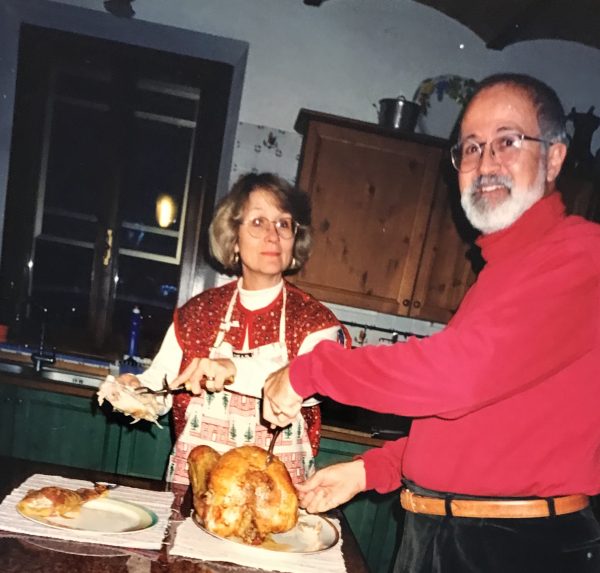 I’d ordered the turkey the previous week from the butcher. When we came to collect it on the day before Christmas, neither he nor his customers could believe that we wanted 7 kilos (15+ pounds). For Italians, meat is eaten in moderation, as part of a multi-course meal featuring antipasto, pasta, entree, sweets and/or fruit.
I’d ordered the turkey the previous week from the butcher. When we came to collect it on the day before Christmas, neither he nor his customers could believe that we wanted 7 kilos (15+ pounds). For Italians, meat is eaten in moderation, as part of a multi-course meal featuring antipasto, pasta, entree, sweets and/or fruit.
“How many people will eat this turkey?” the butcher asked me in Italian.
“Quattro.” (Four)
“Quattro?” he asked, his voice filled with incredulity.
“Quattro Americani.”
“Ah…quattro Americani!” (as if that helped clear up the mystery). After a pause, he continued with a twinkle, “Per quanti anni, signora?” (For how many years?)
I twinkled back, “Per la vita!” (For life!)
Christmas Eve in Amelia: Butcher, customers and Americans sharing the joy of laughter.

COMING NEXT MONTH
Italy, 1998
Fare Thee Well

LET ME HEAR FROM YOU.
Please take a moment to share your thoughts.
Your comments help make the blog better, and I always answer.
* * *
If you enjoyed reading this post, I hope you’ll SUBSCRIBE by clicking on the button below. Every month, when I post a new excerpt from my life overseas, you’ll get an email with a link so you can read the next installment. Subscription is free, and I won’t share your contact information with anyone else. Your subscribing lets me know you’re reading what I write, and that means a lot.

